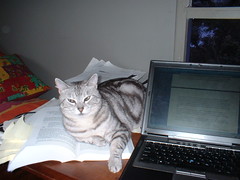tangent
My friend Gillian Busch is midway through her study of families and mealtimes. She has been doing some very fine-grained analysis of her fascinating data. So, I thought of her study when when I came across some papers by Eric Laurier on his website. They are beautifully written and a number encompass the cafe. Last night i was reading one called Drinking up endings; Conversational resources of the cafe. Here's a sample:
"... we have seen then through a detailed description of one cafe visit ending how the very fact of drinking, rather than what substance people are drinking, eases the conversation along. In particular here we have seen how the last sips are involved in the last remarks on a converssation on a particular topic. There is no mechanical determinancy here as we have seen how one potential ending of both drinks and topic can be artfully extended by conversationalists. Alongside this it has hopefully become apparent how the movements and objects that accompany drinking become resources in talking together." (p. 14)


